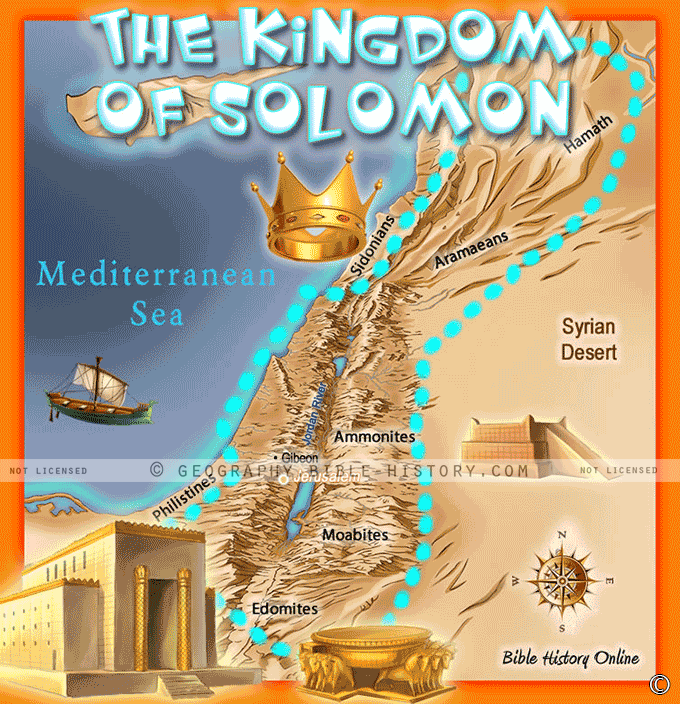
The Kingdom of Solomon stands as a testament to an era of unprecedented grandeur, wisdom, and unity in ancient history. The reign of King Solomon, as recorded in the scriptures and historical texts, is marked by remarkable achievements, legendary wisdom, and an expansive empire that stretched across borders. As we journey through the legacy of the Kingdom of Solomon, we unearth the stories of innovation, cultural flourishing, and the enduring lessons of leadership that continue to inspire to this day.
Wisdom and Prudence
King Solomon is renowned for his exceptional wisdom, most famously displayed during the judgment of the two women who claimed the same child. His sagacity attracted dignitaries from across the world, eager to seek his counsel. This wisdom not only solidified his reputation as a great ruler but also laid the foundation for a prosperous and harmonious kingdom.
Architectural Marvels
The reign of Solomon witnessed the construction of monumental structures, including the crowning jewel – the First Temple in Jerusalem. This magnificent edifice served as a focal point of worship and a symbol of the kingdom's grandeur. The temple's intricate design and lavish decorations reflected the prosperity and cultural sophistication of the era.
Economic Prosperity and Trade
Solomon's administration fostered economic prosperity through shrewd trade and diplomatic alliances. The kingdom's geographical location facilitated lucrative trade routes that connected diverse cultures. This economic affluence contributed to the splendor of the kingdom and enabled Solomon to undertake ambitious projects.
Unity and Expansion
Solomon's legacy extended beyond mere material achievements. His reign witnessed a rare period of unity among the tribes of Israel. His wisdom, diplomacy, and judicious governance garnered the loyalty of his subjects and facilitated cooperation among disparate groups. This unity laid the groundwork for a golden age of cultural exchange and flourishing.
Challenges and Legacy
However, the Kingdom of Solomon was not without its challenges. The vastness of the empire posed administrative difficulties, and the construction projects strained resources. Additionally, the splendor of the kingdom attracted envy and animosity from neighboring powers. The legacy of Solomon is one of both accomplishment and caution, a reminder that power and success come with responsibilities and potential pitfalls.
Lessons for Leadership
The story of the Kingdom of Solomon offers invaluable lessons in leadership. His wisdom, compassion, and ability to navigate complex situations serve as a timeless model for rulers and leaders. The pursuit of wisdom, the balancing of ambition with prudence, and the fostering of unity are enduring principles that transcend time and culture.
The Kingdom of Solomon remains an emblem of a time when wisdom, grandeur, and unity converged. As we journey through its history, we glimpse into an era of remarkable achievements and monumental challenges. The legacy of Solomon serves as an inspiration, reminding us of the profound impact of wisdom-driven leadership, the potential for cultural flourishing, and the lessons to be learned from the rise and fall of empires.
Blank Topo Map of The World
Abraham’s Journey
The Captivity of Judah (586-516 B.C.)
The Fall of Judah 586 B.C.
The Northern Kingdom of Israel
The Southern Kingdom of Judah
The Divided Kingdom
The Fertile Crescent
Ur of the Chaldees
Shechem in Old Testament Times
Prophets, Kings, and Nations
Jesus Last Passover
New Testament Israel
New Testament Places
Old Testament Israel
Provinces of the Roman Empire
Israel during David’s Kingdom
David’s Kingdom
Cities of the New Testament 4
Cities of the New Testament 3
Cities of the New Testament 2
Mediterranean Sea
Cities of the New Testament
First Century Jerusalem
Empire of David and Solomon
David’s Kingdom
Israel Under Rehoboam
Ophir and Tarshish
The Period of the Kings
Ramoth Gilead
Samaria
Solomon’s Temple
Zarephath and MT Carmel
Jabesh Gilead and Tribes
Judah in the Time of David
Kingdom of Saul
Kirjath Jearim
Michmash
Mount Gilboa in the Time of David
Nob Davids Flight
Shiloh
Israel and Judah
Assyrian Empire Under Esarhaddon
Assyrian Empire Under Sennacherib
Captivity of 10 Tribes
Events in 2 Kings
The Khabur River
Israel and Syria
Captives From Judah
Kingdom of Jeroboam
Mesha’s Kingdom
Pharaoh Necho Battles King Josiah at Megiddo
Babylonian, Mede and Persian Empires
Samaria and Nearby Territories
Syria at its Height
Hebron
Mahanaim
1949 Map of Israel With Boundaries
First & Second Journeys of Paul
Journeys of the Apostles
Paul’s Third Missionary Journey
Saul’s Journey to Damascus and Arabia
Paul’s Final Visits
Paul’s 1st Missionary Journey
Paul’s 2nd Missionary Journey
Paul’s 3rd Missionary Journey
Paul’s Voyage to Rome
Phillip Journeys to Samaria and Gaza
Judah at the Time of Amos
Empire of Alexander the Great
Israel Under the Maccabees
Galilee During Maccabees
Idumea Intertestamental Period
Kingdom of the Ptolemies
Kingdom of the Seleucids
Ptolemaic Egypt Seleucid Asia
The Roman World
Kingdom of Ptolemies and Seleucids
The World During the 6TH Century BC
Mount Horeb
The Red Sea
The Exodus
Ezra’s Journey to Restore Jerusalem
Israel and Judah During Hosea’s Time
The Ancient World
Canaan During the Time of Abraham
The City of Shechem
Supposed Location of the Garden of Eden
The Land of Israel in Genesis
The Jordan River
The Kingdom of Nimrod
Mount Ararat and Mesopotamia
The Descendants
Sodom and Gomorrah
The Kingdom of Egypt
The Hamites
The Kingdom of the Hittites
Ur of the Chaldees
Judah at the Time of Haggai
Jesus Passes Through Samaria
